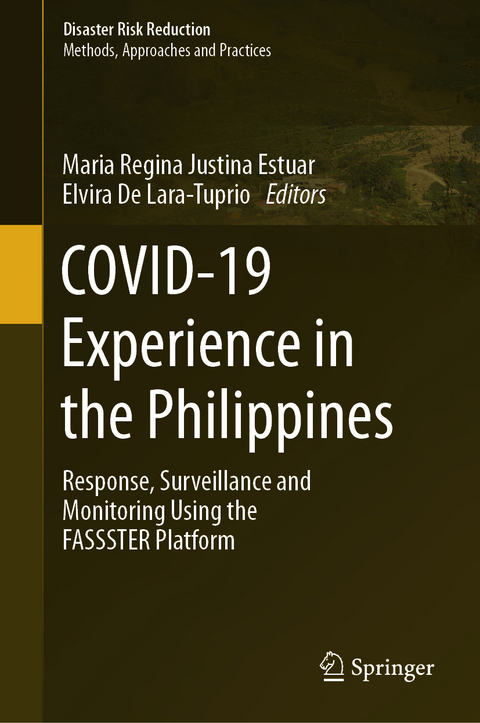
COVID-19 Experience in the Philippines
Springer Verlag, Singapore
978-981-99-3152-1 (ISBN)
Regina Estuar is a full professor in the Department of Information Systems and Computer Science, Loyola Schools, Ateneo de Manila University, Philippines. She holds a senior fellow post at the Philippine Public Safety College where she serves as an adviser to information and communication technology (ICT) tools for disaster resilience. In 2019, she received The Outstanding Women in the Nation’s Service (TOWNS) award for her contribution in science and technology, specifically in the design of ICT-based platforms for public health, disease surveillance and disaster response. In 2012, she founded the Ateneo Social Computing Laboratory to establish a firm foundation in the development of social computing platforms through the lens of social psychology. Since 2007, she has managed the Ateneo Center for Computing Competency and Research (formerly the Ateneo Java Wireless Competency Center), a research incubator laboratory that has been producing technologies for social good and socialchange. In 2020, she led a team of mathematical modelers, data scientists, software engineers and epidemiologists, in designing, developing, deploying and maintaining a scenario-based analytics and disease modeling platform to aid in the management of the COVID-19 pandemic. Elvira P. de Lara-Tuprio is a professor and former chair of the Department of Mathematics, School of Science and Engineering at the Ateneo de Manila University. She has been teaching mathematics since 1990 and financial mathematics, including financial derivatives and risk management, since 2009. She was awarded a FINEX-Citibank Outstanding Finance Educator Award for the National Capital Region in 2011. Outside academe, she is a finance practitioner, having served as a consultant and reviewer of risk management models for a number of local banks since 2010. Aside from finance, her research includes epidemiological modeling and flood hazard modeling. She is also actively involved in mathematics education, through teacher training and reviewing of learning materials and teachers' guides for public schools. She is an author of mathematics textbooks designed for high school and college students. Dr. Elvie heads the mathematical modeling team for FASSSTER.
Chapter 1. Origins of FASSSTER.- Chapter 2. Management of COVID-19 Data for the FASSSTER Platform.- Chapter 3. FASSSTER Data Pipeline and DevOps.- Chapter 4. Disease Surveillance Metrics and Statistics.- Chapter 5. Effective Reproduction Number Rt.- Chapter 6. The FASSSTER SEIR Model.- Chapter 7. Geospatial and Spatio-Temporal Models.
| Erscheinungsdatum | 30.08.2023 |
|---|---|
| Reihe/Serie | Disaster Risk Reduction |
| Zusatzinfo | 58 Illustrations, color; 7 Illustrations, black and white; XX, 159 p. 65 illus., 58 illus. in color. |
| Verlagsort | Singapore |
| Sprache | englisch |
| Maße | 155 x 235 mm |
| Themenwelt | Informatik ► Software Entwicklung ► User Interfaces (HCI) |
| Informatik ► Weitere Themen ► Bioinformatik | |
| Studium ► Querschnittsbereiche ► Epidemiologie / Med. Biometrie | |
| Studium ► Querschnittsbereiche ► Infektiologie / Immunologie | |
| Studium ► Querschnittsbereiche ► Prävention / Gesundheitsförderung | |
| Naturwissenschaften ► Biologie ► Ökologie / Naturschutz | |
| Naturwissenschaften ► Geowissenschaften ► Geologie | |
| Schlagworte | COVID-19 pandemic in the Philippines • data-driven decisions • Disease surveillance platform • Localized disease modeling • Response to COVID-19 |
| ISBN-10 | 981-99-3152-5 / 9819931525 |
| ISBN-13 | 978-981-99-3152-1 / 9789819931521 |
| Zustand | Neuware |
| Haben Sie eine Frage zum Produkt? |
aus dem Bereich


